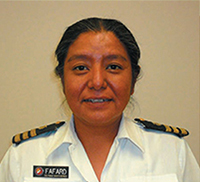 Why did you choose your specific health professional career?
Why did you choose your specific health professional career?
I knew from the time that I was 4 or 5 that I wanted to be a nurse. My mother was attending nursing school and I knew that I would too.
What experiences did you have to make sure this profession was right for you?
I used to volunteer at Phoenix Indian Medical Center (PIMC) where my mother worked. I volunteered during summer breaks when I was 12-13 years old and when I was 17-18 years old. I started working in a nursing home as a Nursing Assistant to get more experience with patient care when I was around 19-20 years old. Being around patient care areas early on helped me to see the many dynamic parts in the nursing profession. I learned to work as a team member early on in my adulthood through the volunteer and nursing home work experiences. I also had many older relatives with chronic diseases, like diabetes, which required ongoing healthcare maintenance. Through them, I learned the importance of strong disease care management and how it can improve the quality of life when care is taken to manage the illnesses or injuries closely. I saw and continue to see, daily, what happens when disease care management is not strong.
Describe any obstacles or barriers to success that you encountered along your health professional career path and how did you overcome them?
You can’t allow your thoughts to tell you there are ‘barriers’ or ‘obstacles’, otherwise, you may tend to focus on your thoughts and who knows, you may find more problems. I’ve viewed my life experiences as events, situations, and experiences that require certain actions on my part to reach my goal. When a challenging situation takes place, I determine what I have control over in particular, and then focus on what needs to be done. Such things as time, physical/mental/emotional/spiritual energy, family, and other people can pull you down, if you allow, to places in thought that are not productive, nor worthwhile. The Creator has a purpose for all on this earth and with this knowledge and assurance I have always had the comfort to continue through the challenge (barrier or obstacle), knowing that the Creator will guide me where I need to be; the key is to allow this to happen. While I was away at college, I missed my family at home on the reservation. I missed out on many of the daily happenings that continued while I was away. The challenge of being away from my reservation and away from family made me even more determined to do well and finish school as soon as I could so that I could go back home. I also learned about the local tribes and got involved with community activities, which also felt like being home.
What do you do in your current job?
I am the department supervisor for the Case Management Department. I supervise 5 Registered Nurses, 1 secretary, 1 Medical Support Assistant, 1 Patient Registration Supervisor, 8 Benefit Coordinators and about 40 Contact Representatives. We are responsible for helping patients along the continuum of care focusing on: care coordination, alternate resources (Medicare, Medicaid and Private Insurance), identification and management, cost containment, and patient and provider advocacy. I also serve as an ad-hoc member of the PIMC Executive Management team, which allows me to participate in matters pertaining to the medical center and the urban and tribal communities we serve. I support the CEO Management team in providing input as to: how people access care, how care is paid for, who pays for care, and how we can design our systems to provide care to as many people with the available resources we have.
What advice do you have for American Indian/Alaska Native students who are interested in health careers?
Stick with your program!! We have such a tremendous need for AI/AN people to provide the care and healing to those who need our help. It is our responsibility to take care of our children and our elders. This is what has allowed us to survive for the many thousands of years. Our AI/AN ill and injured respond so much better to culturally appropriate care. YOU are the one who can provide this service with the gifts and talents laid before you. There are many options especially with all the advances in technology. The variety of healthcare careers available gives you the freedom to find something that you enjoy and that your community needs.

